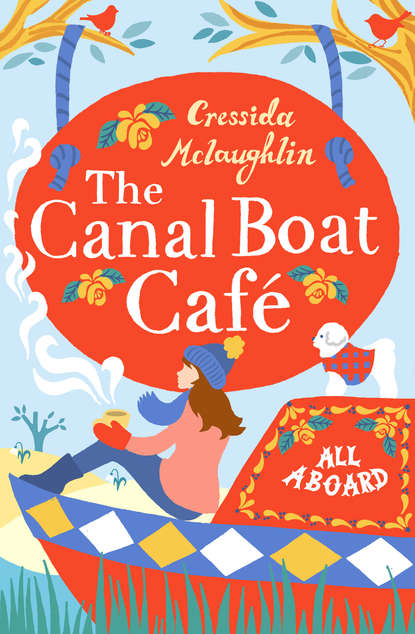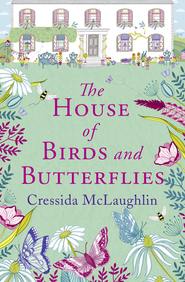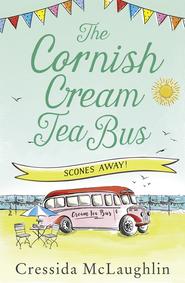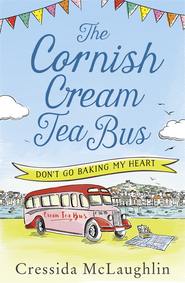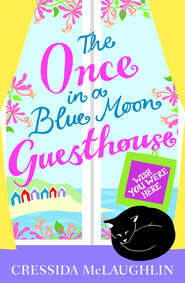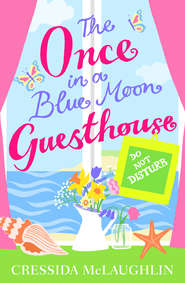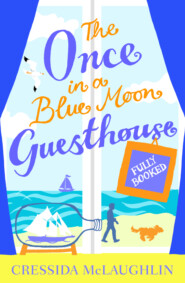По всем вопросам обращайтесь на: info@litportal.ru
(©) 2003-2024.
✖
All Aboard: A perfect feel good romance
Автор
Год написания книги
2019
Настройки чтения
Размер шрифта
Высота строк
Поля
Summer wiped her hands on a tea towel and, checking the oven timer, followed Valerie into the café. It looked brighter, despite the smeared windows limiting the amount of sun that was coming in. The counter was clean, the cake domes waiting for fresh brownies, a glass full of snowdrops that Summer had picked on her walk back from the car sat next to the till. Before she’d had a chance to respond, Valerie hugged her, squeezing tightly, her earring grazing Summer’s cheek.
‘Blackboard,’ Summer managed.
‘Look what you’ve done,’ Valerie said. ‘Look what a difference you make.’
‘We’ve done this,’ Summer said, gently wriggling out of Valerie’s grasp, ‘and it’s not there yet. Besides, anyone could have helped – it’s the difference between one pair of hands and two. That’s all.’
Valerie shook her head. ‘Stop being so humble. You were meant to run this café.’
Summer swallowed. ‘No I wasn’t,’ she said quietly. ‘Mum was. This should still be Mum’s.’
Valerie seemed to deflate, the light leaving her eyes, and Summer felt instantly guilty. But she couldn’t help it. Her mum had been robbed of her life far too soon, and when she was living it to the full, too. Summer hadn’t been able to reconcile herself with what had happened, or the fact that she was partly to blame.
‘I’ll do the blackboard,’ she said, grabbing the A-frame from where it was leaning against the counter, and the coloured chalks. Her feet echoed on the wooden floor and the boat swayed slightly as she walked through the café and out on to the deck, and then across to the towpath. She set the A-frame near the open hatch and crouched, pressing her bare knees into the ground, the leather of her boots cracking.
She thought for a moment, and then, in blue chalk, wrote: Keep out the cold with a fresh bacon roll. The writing was bold and swirly. Whenever Summer had worked on the boat with her mum, Madeleine had got her to do this part. Summer was a sign-writer by trade, and it came naturally to her, the lettering looking professional, evenly spaced and not misshapen. Add a coffee or tea,she added underneath in red chalk, for an extra 50p. She’d just started on her final line when she felt a presence behind her.
‘What’s this?’ the familiar voice said, and Summer pressed too hard and snapped the chalk. She crouched, and then pushed herself to standing, brushing dirt off her knees before turning to face Jenny.
‘What does it look like?’ Summer said, pulling herself up to her full, five-foot-four height, trying to minimize the feeling of being talked down to.
‘Like you haven’t got a cat in hell’s chance of selling anything,’ Jenny said. ‘People won’t be endeared to you because of a few childish rhymes.’ She was dressed in black, her auburn hair pulled back, her fringe framing her pinched face. Summer thought she must be in her mid-forties, but looked older than Madeleine had, which was probably another reason – on top of all the others – that Jenny had taken against her.
‘But maybe they’ll see that we’re welcoming. Anyway,’ Summer said, ‘Valerie’s been doing it all on her own, and now I’m back to help. What makes you think we can’t be successful?’
‘Because things have changed, Summer. Hasn’t Valerie told you?’
Summer glanced at the boat. ‘Told me what?’
‘We sell professional cakes now, and we’re open from ten. You should see the kitchen, the utilities we’ve got. Why not come over and sample some of the red velvet cake I made yesterday? It’s as light as a feather, and still moist.’
Summer folded her arms. ‘I can’t imagine you mean that.’
‘Of course I do,’ Jenny said, giving her such a wide smile that Summer thought for a second that all might be forgiven. ‘That’ll prove to you that your pathetic attempt at a café is finished.’
Summer felt a surge of defiance that shocked her. ‘You’re wrong.’
‘Sometimes the truth hurts, Summer. I should know that better than anyone. It’s admirable of you to come down here and try to rescue it, but you have to face up to the fact that you’re at the helm of a sinking ship.’
‘But we’re a café,’ Summer said. ‘It says it there, on the side, in beautiful writing.’ She pointed to the boat. ‘You’re a pub. I bet hardly anyone knows that you sell cakes as well, and just because you’ve got a new blender and some fancy recipe books doesn’t mean they’re any better than ours.’
Jenny’s expression hardened into anger. ‘You haven’t got a hope,’ she hissed, ‘not any more. The sooner you come to terms with that, the better.’
‘Why do you get to make the rules?’ Summer asked. ‘Why can’t we both do our own thing and not get in each other’s way?’
‘You know why.’
‘But I haven’t done anything wrong,’ Summer said, trying and failing to end the argument. ‘You can’t attack me just because of what happened months ago. Why do we need to have this battle? If I’m going to be coming back here—’ Summer stopped, the words on her lips before she’d had time to consider them.
‘Are you?’ Jenny shot back.
She stared at the pub owner, at her conservative outfit of black trousers and a black shirt, professional but devoid of personality, at the challenge in her face, and realized she didn’t have the answer.
‘Maybe,’ she managed, but she knew her indecision was all that Jenny needed.
Jenny gave her a triumphant smile, and then spun on her heels. ‘Count your losses, Summer. Go back to your life, and leave this place in the past.’
Summer watched her climb the path that cut through the grassy slope, up to the front of the pub. ‘Crap,’ she murmured. She turned back to the chalk board and saw Valerie peering at her out of the hatch, a worried look on her face.
Seeing Jenny had been as bad as Summer had feared it would be, but it had also lit a flame inside her. For the first time that day, she felt some of the passion for The Canal Boat Café that she knew her mum had had. What Jenny had said was untrue, and even if Summer wasn’t ready to come back to Willowbeck more permanently, she couldn’t let her win.
‘So Jenny’s really upped the ante with the baking,’ she said as she took her own batch of brownies out of the oven, the heat hitting her, quickly followed by the rich smell of melting chocolate and butter.
Valerie nodded. ‘They don’t just do the standard pub food any more. Dennis refurbished their kitchen last year, not long after … after the summer.’
Summer frowned. ‘Really?’
‘I suppose there was a space to fill,’ Valerie said quietly.
‘No,’ Summer replied, ‘that can’t be why. I mean, perhaps for Jenny, but I can’t imagine Dennis ever taking that attitude.’
Valerie caught Summer’s eye. ‘I’m not sure he would have had a choice.’
Summer exhaled loudly, put the brownies on the cooling rack, and turned back to her scone mixture, wiggling her fingers before diving in. It was her favourite part, rubbing the butter and flour together, and today she was going to treat the dough as a culinary stress-ball.
‘So you’ve not had much cheeriness from the pub these last few months, then?’
‘Dennis smiles at me, when she’s not around.’
‘Damned by association.’
‘I don’t think Jenny has a good day unless she can have an argument with someone.’
‘And then force them to eat a cake,’ Summer added. ‘That must get confusing for people.’
Valerie tittered, the sound small and unconvincing. Summer had noticed that much of the older woman’s confidence was gone, deferring to Summer for everything, even whether she should put the blackboard outside. She turned away from her mixture, gestured for Valerie to move into the café and followed her out with the brownies. They weren’t nearly cool enough, but sticky, melting brownies were better than no brownies, and the February wind coming through the hatch would soon cool them down.
She put them on the plate, leaving the glass dome off, and made two coffees. She gave one to Valerie and sat at one of the tables, Valerie sitting opposite her.
‘It must have been lonely here, since Mum died.’ It hurt Summer to say the words, but over the last few hours she’d realized that if she couldn’t even say it, then she couldn’t do anything about the boat’s predicament with any kind of conviction.
‘I have my readings,’ Valerie said into her coffee. ‘And I’ve been serving customers, however ineffectively. Mr Dawson from the village gets a latte on his way to work, strolling along the towpath in his suit, and passing boaters are always friendly, commenting on the colour of Moonshine.’
‘Dark lavender’s a beautiful colour,’ Summer admitted. ‘And unusual for a narrowboat. But even so, with the pub being so hostile – do you ever go in there?’
‘Sometimes, when I want a hot meal and I haven’t got the energy to cook. I have no grudge with them, and as I said, Dennis is always amicable, and the other staff are pleasant enough.’
‘But Norman’s a bit reclusive, so I guess down here …’ She looked out of the window as a couple of mallards swam past, the drake’s green feathers glinting in the sun. ‘Who’s in The Sandpiper? That wasn’t here before.’





